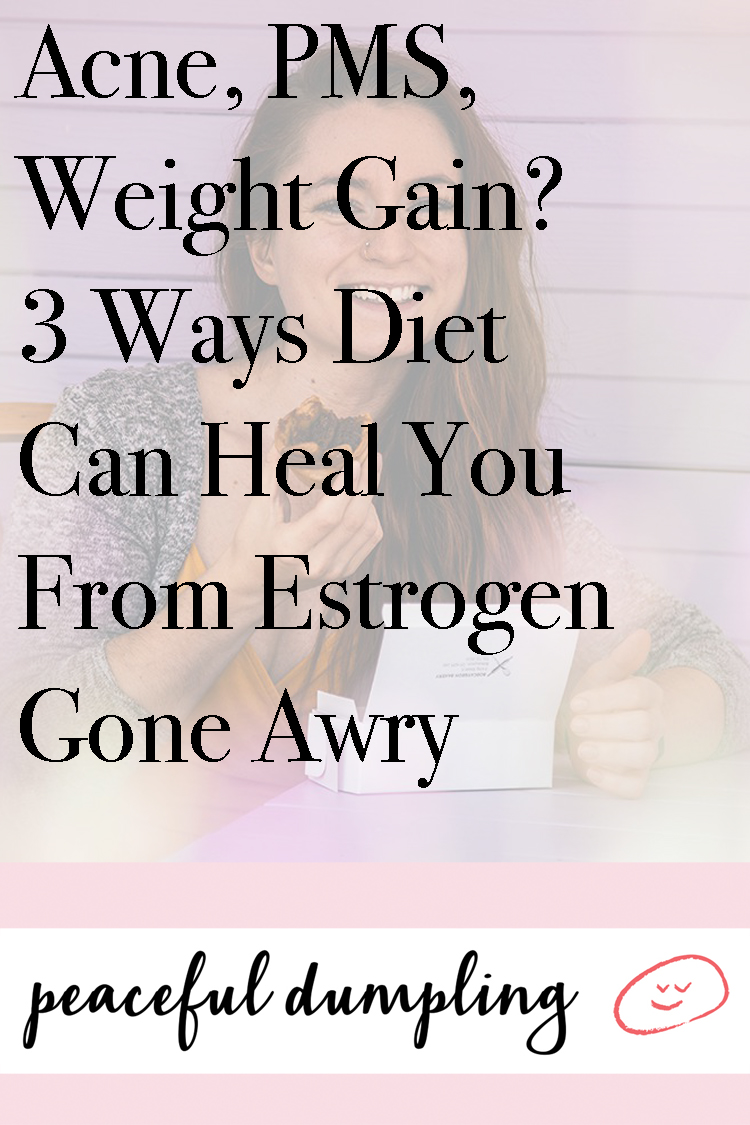The female body is an incredibly complex piece of machinery that requires proper care to run smoothly. Many factors govern our health and wellbeing, but one that isn’t discussed nearly enough is how we can eat our way to a healthy menstrual cycle. This knowledge can be a Godsend if you’re struggling with one of an array of inconvenient or unpleasant side effects of an imbalance, such as persistent weight gain, fatigue, irregular cycles, painful cramps, acne, Polycystic Ovarian Syndrome (PCOS), extreme mood swings, cravings and so much more.

Making the connection that our bodies are affected by how we interact with the world and what we eat is an incredibly empowering lesson to learn. It means that suddenly our health is within our control and changes we make can drive momentum in a direction where we end up feeling better. You can’t avoid every little illness that you’ll encounter in this life (because sweet Lordy those viruses will catch you out!) but you can lay the foundations for the healthiest you possible, so that you are best prepared to handle those unexpected things that come your way.
So, let’s talk hormones. Our bodies produce a whole bunch of them that facilitate everything from maintaining our internal circadian rhythms to regulating our metabolism, heart rate, blood pressure, breathing rate, immune responses…the list goes on. But today, we’re talking specifically about the sex hormones: those produced by our ovaries. These are progesterone and estrogen.
Our ovaries secrete progesterone after we’ve ovulated. Its job is to prepare our bodies for pregnancy (in case the egg released during ovulation is fertilized). It thickens the uterine lining and gets us ready to support a baby. If that egg isn’t fertilized, the corpus luteum (what’s left of the egg follicle after we ovulate) breaks down and we stop releasing progesterone. The result: menstruation.
Today, though, we’re discussing the other one – estrogen – which is often the culprit of so many undesired symptoms. Estrogen is the hormone that turns us into women during puberty. It’s made predominantly by the ovaries, but also by our adrenal glands (situated just above our kidneys) and also our body fat. It affects many different body functions outside of our menstrual cycle, including our cholesterol levels, skin, bones, heart and moods and when levels are too high, we can run into some serious issues, as I mentioned earlier.
Unless you’ve been through menopause or had your ovaries surgically removed, you are much more likely to encounter the side effects of high estrogen levels rather than low. These include all the typical things women complain about while on hormonal birth control that disagrees with them, which might be a situation you find yourself in now.
I decided to ditch the pill last year and I’ve been on a meandering journey healing my body of the side effects of taking synthetic hormones for so long. The most important and empowering step for me has been taking charge of my diet. When you’ve got excess estrogen in the body (such as what happens when you take the pill), it’s important to do what you can to not only stop the level from increasing further, but also aid your body in detoxifying itself of that excess.
Excess hormones are broken within the liver. This remarkable organ is responsible for detoxifying our bodies of all the chemicals we fill them with by breaking them down and passing them into the colon for excretion. So, things like alcohol, artificial colors and flavors, pesticides and drugs all eventually make their way to the liver to be filtered out. Hormones – like estrogen – follow this same pathway.
Estrogen is supposed to be secreted into the body, do a job and then pass to the liver where it’s broken down and excreted. If it isn’t, it actually gets reabsorbed, accumulates and as a consequence leads to a myriad of problems. If the liver isn’t functioning at its optimum or we aren’t consuming ample fiber to, ahem, help it along, this wreaks havoc on our bodies. We see mood swings, acne, migraines right up to fibroids and endometriosis as a result of this inefficient processing.

This is where diet comes into play!
How to Eat to Heal Hormonal Imbalance
Step one is absolutely minimizing anything that takes up “liver time” where it could instead by spent vacuuming up estrogen. So, alcohol, processed food laden with additives, phytoestrogens and xenoestrogens (those things that mimic estrogen in the body) all need to be culled.
Step two is increasing your fiber. Do this gradually to avoid a sudden bloat, but try to incorporate more whole foods, particularly root vegetables and leafy greens into your daily diet. Legumes and fruits are also great!
Step three is cutting out the sugar. Sugar is one of those things that really takes up a lot of our liver’s time. When we consume more glucose than our cells can readily absorb, our liver converts that sugar to glycogen, where it is stored until needed. If we’re constantly causing spikes in blood sugar by consuming too much of it, the liver becomes overworked in having to be on lookout 24/7 to quickly neutralize this. And when the liver is too full of glycogen, the sugar gets turned straight into fat. Do you remember what I mentioned earlier? Our fatty tissue is another source of estrogen production in the body. So you see, it’s a vicious cycle.
Getting your daily diet in check is the most important part of eating for your menstrual cycle, though there are also firm believers in adopting liver cleanses to help the body along a tad. Not a fan of anything too extreme, personally, I prefer to keep up a healthy intake of things like lemons, beets and broccoli which are all excellent at giving us a nutritional boost and pumping us full of antioxidants. Milk thistle and tumeric, on the other hand, have excellent anti-inflammatory properties. Try these in teas. Aim to eat a varied diet and chances are that you’ll likely start incorporating many nutritious and delicious whole foods into your meals that are helping your liver along without you having to give it much thought. No intense 5-day starvation cleanse necessary.
Food is everything. It’s pleasure and connection and healing all in one tasty medley. If you’re sick of feeling like your hormones are getting the better of you, start in the kitchen and watch as you morph into your very best self, right before your eyes. Your only regret will be that you didn’t take charge sooner.

Have you been struggling with the effects of excess estrogen or hormonal imablance? How could you change your diet today?
Also by Kat: Ugh! Air Pollution Hurts Mental Health. How To Protect Yourself Without Moving
Related: Exhaustion, Low Libido? Exactly How to Workout to Help Your Hormones
Got a Hormonal Imbalance? You May Be Deficient In This Mineral
Get more like this–sign up for our newsletter for exclusive inspirational content!
—
